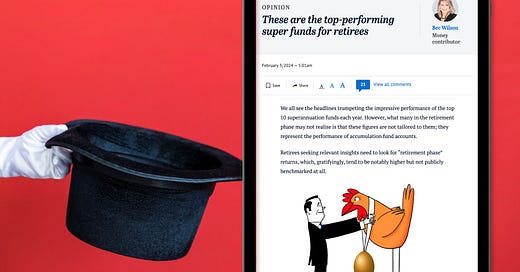These are the top-performing super funds for retirees
I've sourced the top ten retirement phase funds list for you this week, so you can check and compare your fund's performance for 2023. And, Steve has written a great letter.
In this edition
SMH/The Age article: These are the top performing superfunds for retirees
Your letters
It’s Sunday, so today I’m sending you my column that is featured in The Sunday Age, The Sun Herald and the Brisbane Times and WA today.
The Sunday email is meant to be short, so I wont ramble on. If you’re looking for something to do today, pop on some headphones and have a listen to Prime Time - our podcast. Season 2 is about to launch!
I really am loving your letters and we’re going to start featuring them in the Prime Time podcast too, from our next studio session on Monday! So send me your questions and stories. Let me know what’s working for you as you traverse pre-retirement and what’s not.
Have a lovely Sunday. Make it epic!
Many thanks! Bec Wilson
Author, podcast host, columnist, retirement educator, and guest speaker
Each weekend I write a column in both the print and digital editions of The Age, The Sydney Morning Herald, Brisbane Times and WA Today money section. This article was first published here.
We all see the headlines trumpeting the impressive performance of the top 10 superannuation funds each year. However, what many in the retirement phase may not realise is that these figures are not tailored to them; they represent the performance of accumulation fund accounts.
Retirees seeking relevant insights need to look for “retirement phase” returns, which, gratifyingly, tend to be notably higher but not publicly benchmarked at all.
According to Chant West, the top 10 retirement phase funds all showcased returns above 11.7 per cent for 2023, with the highest-performing fund achieving an impressive 14.9 per cent. In stark contrast, the top 10 accumulation funds recorded returns above 10.2 per cent, with the leading fund securing an 11.8 per cent return.
Strangely, there are no funds crowing about their retirement phase returns, possibly because the retirement phase remains poorly served and even more poorly understood.
Retirement phase funds operate and report independently, typically yielding higher returns than accumulation phase funds with the same investment mix, courtesy of their tax-free treatment. Unfortunately, there’s currently no publicly available benchmarking for consumers in the retirement phase.
Today, Chant West shares their industry benchmarking of the top 10 retirement phase funds for one and 10 years, concluding in December 2023. This analysis aims to unveil which funds are currently shooting the lights out and which ones stand the test of time. But before I walk through the performance insights, let’s build a foundational understanding of the retirement phase.
You should be considering whether your fund can weather the tests of time, to really see the power of compound investing in your super account.
There are two core phases for your superannuation. The first is the accumulation phase, where you contribute funds into your accumulation account and pay 15 per cent tax on earnings in the fund.
Then there’s the retirement phase, where you roll your money over into a retirement phase account, generating tax-free income, and make compulsory drawdowns based on the government-set drawdown rate corresponding to your age.
The amount you can hold in your tax-free retirement phase account is capped at $1.9 million over your lifetime, known as the transfer balance cap. If you exceed this, the surplus is kept in an accumulation account, subject to higher taxes on the generated income.
Most people don’t realise until after they retire that up to 60 per cent of the passive investment returns your fund generates will happen in the retirement phase if it’s invested wisely.
This is because of the power of compounding on bigger balances as you get older, coupled with the higher returns you get from the tax-free status of retirement phase super. Even with a drawdown of 4-6 per cent, your balance can continue to grow.
In 2020, the government introduced YourSuper, a performance benchmarking process for accumulation funds, complete with a public website for comparing annual performance and fees. It’s a terrific tool and the transparency it offers consumers has seen many switch away from expensive and underperforming funds.
The superannuation system, at just 32 years old, is now seeing a surge of people moving into retirement with substantial balances. This demographic shift is now driving a compelling need for similar benchmarking of retirement phase funds, with the government having a proven template in place through YourSuper.
But meanwhile, retirees who check performance and fees regularly have to cobble together information from each fund’s website and scour for publicly available fee and performance data, much of which is not uniformly measured.
So get out your statement for the end of the 2023 calendar year and see for yourself whether your retirement phase fund’s performance is good enough.
Read the rest of this article, including viewing the top ten Growth Funds for 2023 on The Age, The Sydney Morning Herald, Brisbane TImes and WA Today - here.
Hi Bec
I’ve just ceased work, started a 6-month period of long-service leave, then will retire immediately thereafter. And I am giving myself the long-service leave as a period of transition, while I still receive a full salary, to plan and organise my retirement. I have a substantial amount of superannuation but don’t own my own house, so making that purchase, and working out where to live, come pretty high up my list.
And I’ve been subscribing to your email newsletters for several months, but didn’t get to read them until today – but have now binged and caught up. And I have one question. You talk a lot about the importance of converting superannuation funds into ‘retirement phase’, including in your most recent newsletter, and how this is poorly understood by people. Well, add me to the list! What exactly is ‘retirement phase’? I’ve never seen that explained clearly, and venture that lack of explanation or understanding of what ‘retirement phase’ means may be why people don’t understand it.
Does converting my superannuation into ‘retirement phase’ involve withdrawing all my superannuation? Or does it involve going to those funds and asking about a ‘retirement phase’ account? Will they understand that phrase?
I trust that there is a common language for me to have that discussion with my super funds?
Grateful for any clarity you can provide. All the best, Steve
Hi Steve
I hope you saw my story in this week’s Epic Retirement newsletter about the things to think about when buying a home for your retirement years. If not - check it out here. And good luck with the house-shopping.
Now let’s talk retirement phase. Retirement phase is the phase when you convert your super from accumulation account into a retirement phase account - and you do that by calling up your superfund and asking them about doing so. You really should take the opportunity to speak to a financial adviser, either from your super fund, or independently.
It’s worth pointing out that once you do convert your funds into an account based pension you must make compulsory drawdowns (the % of which is defined by your age), and you pay no tax on the income generated by your fund in retirement phase (but 15% in accumulation) - up to the transfer balance cap ($1.9M at the moment).
If you contact your superannuation financial advice team they will work you through it. And yes - they’ll know the lingo ‘retirement phase’ and they might teach you a few more words worth understanding like:
Transfer Balance Cap: The maximum amount that can be transferred into a tax-free retirement phase account, currently set at $1.9 million.
Drawdown Rate: The percentage of a retiree's superannuation balance that must be withdrawn annually as income during the retirement phase.
Account Based Pension: A type of retirement income stream where funds from a person's superannuation account are converted into regular pension payments, providing a steady income during retirement.
Thanks again for your note. Enjoy your long service leave.
Cheers, Bec
Have you got a letter you’d like to send in for me to answer on the podcast or on the newsletter? Email me at bec@epicretirement.com.au.










